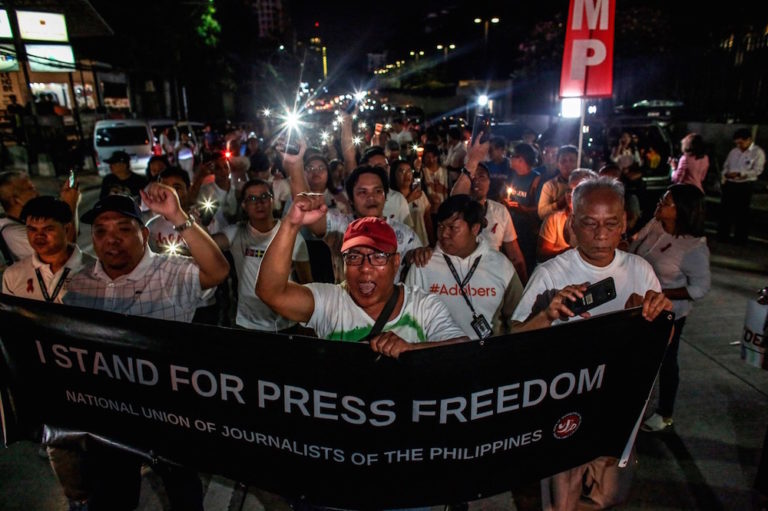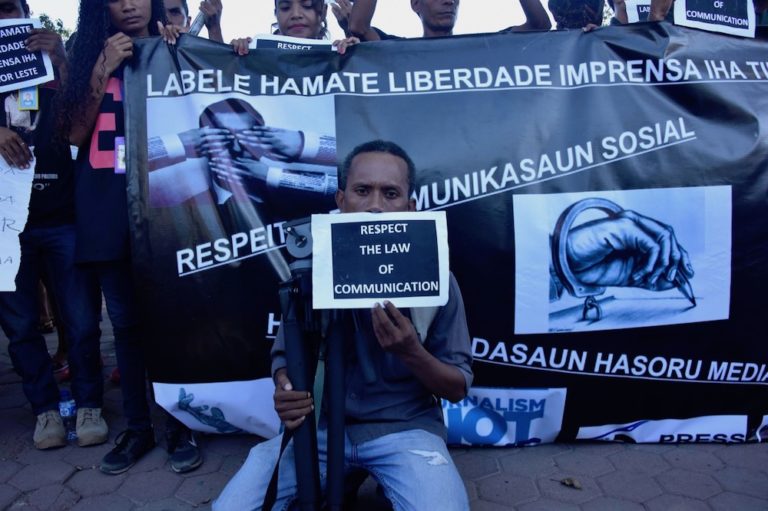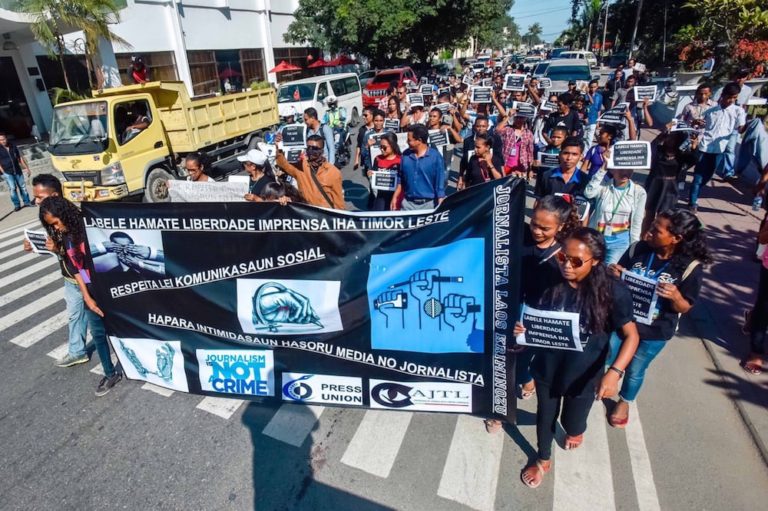(CPJ/IFEX) – CPJ is alarmed by the attacks against journalists working in East Timor that have accompanied the sharp escalation of violence in the province in recent weeks. Conditions are now extremely dangerous for journalists reporting in East Timor, as they are increasingly targeted by pro-government militias offended by press coverage of their activities. **Updates […]
(CPJ/IFEX) – CPJ is alarmed by the attacks against journalists working in
East Timor that have accompanied the sharp escalation of violence in the
province in recent weeks. Conditions are now extremely dangerous for
journalists reporting in East Timor, as they are increasingly targeted by
pro-government militias offended by press coverage of their activities.
**Updates IFEX alerts of 29 March, 10 March and 24 February 1999**
The pro-government militias have launched a campaign to terrorise the local
population and undermine plans for an upcoming United Nations-sponsored vote
on the province’s autonomy, which could result in East Timor’s independence
from Indonesia. The militias support the province’s integration with the
country. As scores of civilians have been murdered, physically assaulted,
and threatened by these paramilitary groups, CPJ has documented a series of
attacks designed to suppress media coverage of the atrocities.
On 24 February 1999, Portuguese journalists Jose Alberto Carvalho, a
reporter for the privately owned SIC television station, and Jose Maria
Cyrni, a cameraman for the same station, were assaulted by a pro-government
mob in Dili. The two were in the East Timorese capital’s Becora District,
reporting on the violent clashes that erupted when pro-Indonesia militia
soldiers fired on independence supporters during a funeral procession. Their
assailants destroyed at least one camera and mobile phone, threatened the
journalists at gunpoint, and beat the two severely before taking them to
Becora police headquarters. Cyrni and Carvalho were reportedly well-treated
by police, who turned them over to a pro-independence group that had
gathered outside the police station to escort them to safety.
On 25 February, in a faxed warning sent to various news agencies during
Australian Foreign Minister Alexander Downer’s visit to Indonesia, two
pro-integration militia leaders declared that “It is better to sacrifice an
Australian diplomat or journalist to save the lives of 850,000 East
Timorese.” The one-page statement noted that East Timor was “a victim of the
dirty game by Australian myopic and deceitful journalists,” and was signed
by Cancio Lopes de Carvalho and Eurico Guterres, the commanders of the
Mahidi and Aitarak militias, respectively.
On 26 March, about twenty members of the paramilitary group Mahidi stormed
into the offices of the newspaper “Suara Timor Timur” (STT) and threatened
to burn down the building as punishment for the newspaper’s antagonistic
reporting. Although STT gives space to both pro-integration and
pro-independence voices, militia members accused the newspaper’s staff of
stirring conflict.
On 9 April, John Aglionby, Southeast Asia correspondent for the London-based
“Guardian” newspaper, and Jenny Grant, Jakarta-based correspondent for the
“South China Morning Post”, were threatened and harassed by members of the
Red and White Iron militia (Besi Merah Putih), a pro-Indonesia paramilitary
force, when they visited the town of Liquica. Aglionby and Grant were
investigating the massacre of at least twenty-five villagers on church
grounds there on 6 April. Two militia members apparently spotted the
journalists on the outskirts of town, and eventually managed to overtake
their car. Armed with swords, they threatened to set the car on fire and
assault the driver if he did not immediately transport the journalists back
to Dili, the capital of East Timor. The militiamen escorted the journalists’
car back out of Liquica on motorbikes, and blocked it from entering the
Liquica police station, where Aglionby and Grant hoped to file a complaint.
In plain sight of police standing nearby on the station’s verandah, the
militia members screamed at the driver to turn around, and repeated their
earlier threats. Because police made no move to guarantee the safety of the
journalists or their driver, they were forced to retreat.
On 11 April, some two dozen members of the Red and White Iron militia
attacked a convoy of journalists returning from Liquica. The journalists
were on their way back from covering a mass held by East Timorese Nobel
laureate Bishop Carlos Belo at the site of the 6 April massacre.
John Aglionby described the attack in the 12 April edition of the “Guardian”
newspaper, reporting that a large rock crashed through the windshield of his
car, narrowly missing his head, and that “this was immediately followed by a
3-ft. metal pipe that came through the hole made by the stone and grazed my
back.” The mob struck at the cars with swords, machetes, and iron bars.
Jenny Grant of the “South China Morning Post”; her husband, Ric Kurnow, a
producer for the American news network CNBC; Jorge Pinto and Leonel Castro,
correspondents for the Portuguese newspaper “Jornal de Noticias”; and
Emmanuel Dunand, a photographer for Agence France-Presse, were also among
those attacked. Some journalists involved in the incident preferred not to
be identified for security reasons.
A police truck accompanying the convoy did not intervene to protect the
journalists.
On 17 April – the same day that pro-Indonesian militia members led a rampage
across Dili, killing at least twenty people – members of the Red and White
Iron militia ransacked and destroyed the Dili offices of “Suara Timor
Timur”, effectively shutting down East Timor’s only local independent
newspaper. Wielding sticks and iron bars, militia members battered down the
door to the building, and smashed STT’s computers, fax machines, and
telephones; damage was estimated at 200 million rupiah (US$23,000). Two of
the newspaper’s journalists have fled for Jakarta, fearing violent reprisals
for their reporting. The newspaper’s publisher, Salvador Ximenes Soares, is
not sure whether he will be able to put together the financing needed to
resume operations. In an interview with “The Australian” newspaper, Soares
also expressed his concern that “Obviously, if my journalists are in a
dangerous situation, we will not be able to print.”
Also on 17 April, four journalists were threatened when more than 100
pro-Indonesia militia members stormed the house of a prominent separatist
leader and former member of parliament, Manuel Jose Carrascalao, and
attacked nearly 150 refugees who had sought shelter there. Bernard Estrade,
Jakarta bureau chief for Agence France-Presse, and Marie-Pierre Verot, a
Jakarta-based freelance reporter for several major French news outlets, were
inside Carrascalao’s home when it came under attack. They were pushed,
beaten, and threatened at gunpoint, while some militia members chanted that
the journalists should be killed.
Gerrit de Boer, Jakarta-based correspondent for the Dutch newspaper
“Volkskrant”, and Dermott O’Sullivan, a correspondent for the British
magazine “The Banker”, witnessed the attack from outside the house. Three
militia members surrounded and threatened to kill de Boer and O’Sullivan,
ultimately forcing them to leave the premises.
Meanwhile, some militia members rescued Estrade and Verot, and escorted them
back to their hotel. Minutes after they were dropped off, the journalists
were visited in their hotel lobby by a man they suspect was from the Red and
White Iron militia. He was accompanied by four men armed with sticks and
iron bars, and asked the journalists to hand over their notes, tape
recorders, and cameras. Estrade refused to surrender his belongings, but
showed the man his accreditation card, issued by the Indonesian government,
and gave him his business card. Neither Estrade nor Verot were further
harmed, and the group of men left the hotel.
CPJ is concerned that the government’s failure to control the paramilitary
groups responsible for these attacks indicates support for their actions.
While military leaders have denied training and arming the many
pro-government militia groups now active in East Timor, both the army and
the police have shown at least tacit complicity in their failure to stop the
militias from threatening and even killing those who disagree with their
views.
Recommended Action
Send appeals to the President:
political reform by guaranteeing the safety of journalists reporting in East
Timor during this volatile period
Wiranto, honour his pledge to ensure that members of the police and army
take decisive action to protect civilians from harm at the hands of
paramilitary groups.
Appeals To
His Excellency Bacharuddin Jusuf Habibie
President, Republic of Indonesia
Office of the President
Bina Graha, Jalan Veteran No. 17
Jakarta Pusat, Indonesia
Fax: +62 21 778 182
Please copy appeals to the source if possible.


